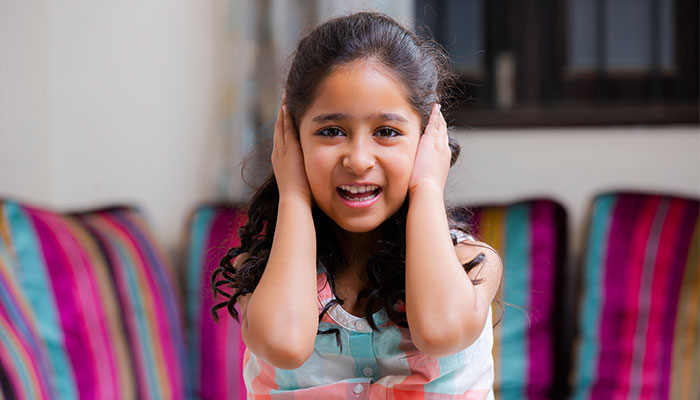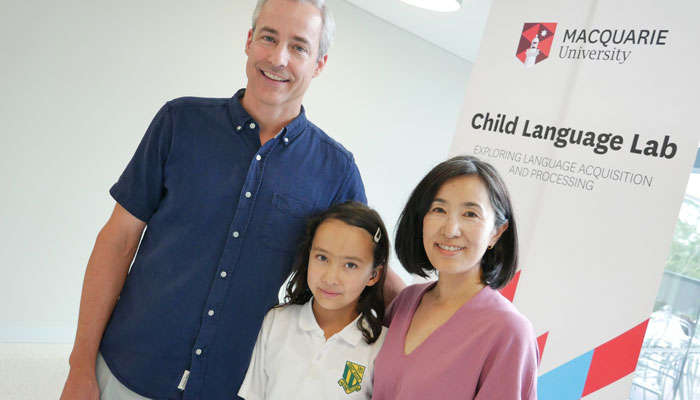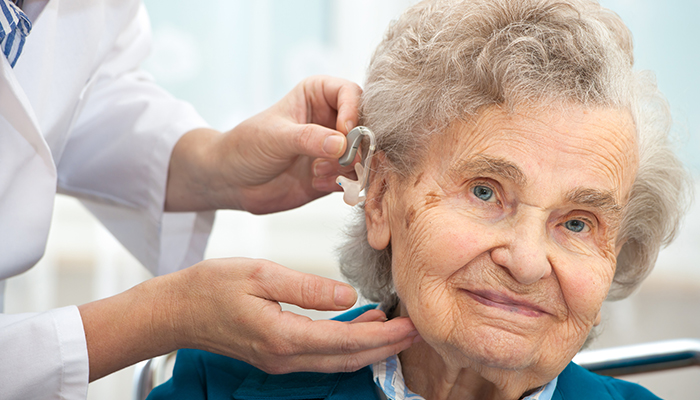At Macquarie University’s Inclusive Junior Science Academy held in the summer holidays, 24 primary school children over two days made invisible ink, colour-changing potions, fake blood and even ice-cream, the latter to investigate the impact of salt on ice.
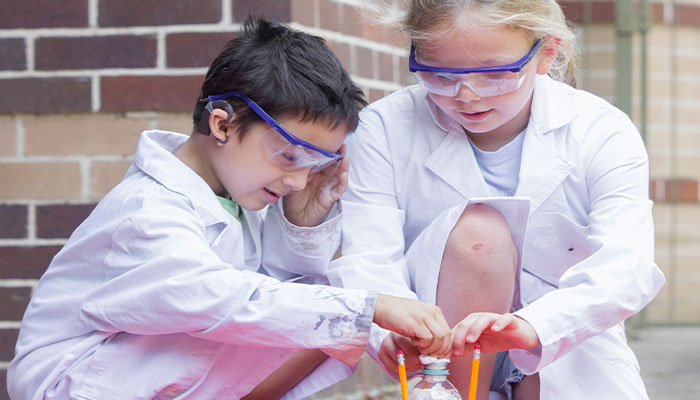
Togetherness: The annual Macquarie Junior Science Academy gives deaf children the chance to meet other children who live with hearing loss, says Dr Chi Yhun Lo.
They dissected sheep’s brains, spread a Zombie virus, made hovercrafts and raced them. Not surprisingly, the kids had a ball, according to the feedback received by the academy organiser, auditory scientist Dr Chi Yhun Lo. What’s not to love about creating a chemical reaction in your mouth by making sherbet? Or seeing how far you can shoot a marshmallow out of a tube?
But what they loved in particular, says Lo, was the rare chance to hang out with other deaf and hard of hearing (DHH) children. In mainstream schools, they can often be the sole student with hearing loss. For some children at the annual Academy, it is the first time they have ever met another DHH person.
“A lot of DHH children often talk about being socially isolated,” says Lo, a member of Macquarie’s Child Language Lab and research group H:EAR , as well as the not-for-profit charity Parents of Deaf Children.
What’s remarkable is, some of the kids have actually never met anyone else who is deaf; this is their first opportunity.
“The vast majority of these kids are being mainstream schooled, and other kids can often be cruel without ever realising it, so this is an opportunity to allow these kids to have a healthy communication space with other kids who have hearing loss.
“What’s remarkable is, some of the kids have actually never met anyone else who is deaf; this is their first opportunity, and a lot of them are so grateful.”
Wrote one junior scientist to their mum, subsequently forwarded to Lo: “Thank you for such a wonderful school holiday! I loved it when you signed me up for the science camp! My favourite part was when I got to meet other deaf people.”
Said another: “Sharing the experience with other DHH kids made it easier for me to speak up when I couldn’t hear because if I couldn’t hear, they probably couldn’t hear either.”
Next generation of scientists
The inclusive academy is a collaborative effort between the Macquarie-based Junior Science Academy, the Australian Hearing Hub and Parents of Deaf Children.
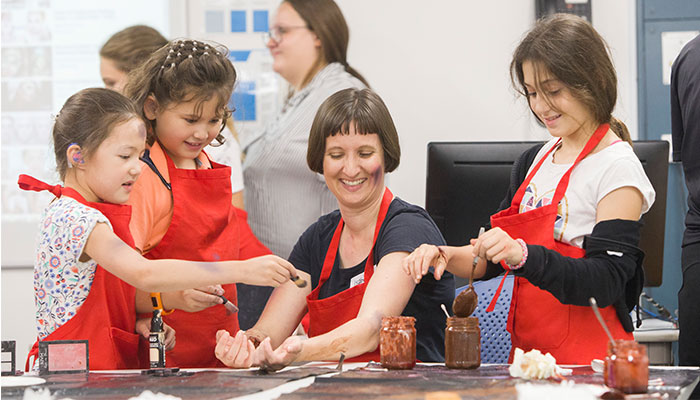
Blood brothers: Dr Isabel O'Keeffe, from Macquarie's Child Language Lab, makes fake blood with Junior Science Academy kids.
It follows the curriculum developed by the mainstream Junior Science Academy, with significant tweaks to make learning as easy and enjoyable as possible. Class sizes are cut to 12 to minimise noise that can make it hard for DHH children to recognise speech, and assistive technologies, closed captions and text handouts are used. There is a higher teacher to student ratio and many trained volunteers, including young deaf adults from Hear For You, further enrich the experience.
“The camp is an opportunity for them to further their educational skills, but also an opportunity for them to develop their social skills, and to develop a peer group,” Lo says.
“And of course, we want to encourage them to become the next generation of scientists!.”
Growing awareness of social isolation
In Australia, there are more than 22,000 children and young adults aged less than 21 years with a hearing loss, with 6255 of those in NSW. About two-thirds have residual hearing, which can be amplified using hearing aids, while one-third are profoundly deaf.
The fact DHH children attend mainstream schools is testament to the effectiveness of Australia’s model of hearing health care. Screening means hearing loss is identified early, in babies and toddlers, and the country is a hub of world-leading assistive technology such as cochlear implants for profoundly deaf children.
“It’s a double-edged sword,” says Lo. “It’s really amazing that DHH kids do go to mainstream schools, but the problem becomes the interpersonal things; if you are just that little bit different at school, for a lot of people it makes it that much harder.”
Distinguished Professor Katherine Demuth, Head of the Child Language Lab, says that DHH children in their socialising at mainstream schools can miss nuances of communication such as irony and sarcasm, which often involve tone and intonation – something cochlear implants, for instance, don’t do well at transmitting.
Your six-year-old friends have disappeared, and you are still trying to understand what that last sentence was – and that is a huge, exhausting challenge.
Demuth is co-leader of an Australian Research Council Linkage Project, Beyond Speech: Towards better communication for children with hearing loss, that is investigating these sorts of communicative challenges faced every day by DHH children.
“You can measure the size of a vocabulary, and it’s probably a good idea to have a large one, but can you use it?” Demuth says.
“If you can but you’re very, very, very slow in doing that, then the conversation is over, it’s finished! Your six-year-old friends have disappeared, and you are still trying to understand what that last sentence was – and that is a huge, exhausting challenge for kids who are going off to school.
“Our ARC Linkage grant is to begin to address this space, where there has been very little research done on children’s communicative use of language.”
The project aims to identify the locus of the listening challenges faced by hearing-impaired children, and to inform clinicians about the types of interventions they can make that will reduce children’s listening effort.
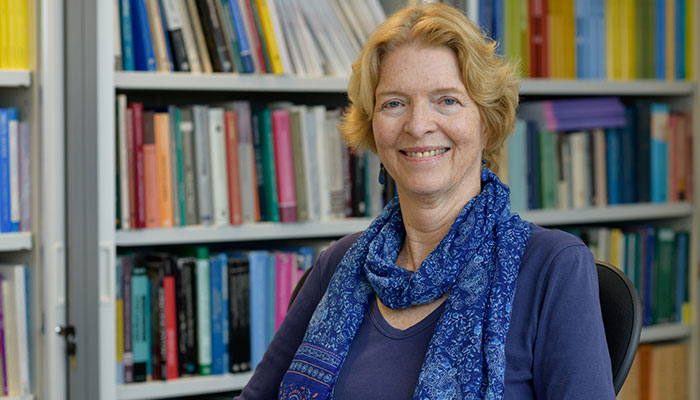
Making life easier: Katherine Demuth, pictured, is working on finding ways to help DHH children communicate with others in the playground at mainstream schools.
The hope is that such interventions would help lessen the social isolation they experience in mainstream schools. In the meantime, the Inclusive Junior Science Academy is an invaluable opportunity for DHH children to be with others who just ‘get it’.
“These kids have to self-advocate on their own behalf every day; they have to tell other people about their deafness,” says Lo. “When they come to a camp like ours, everyone’s like, ‘we get it, don’t worry about it’. You can just be a kid enjoying science.”
Demuth points out the benefits extend beyond the camp itself.
“There is a lot to be said for the occasional networking,” she says. “Those are contacts they make for life, and knowing there is a larger cohort of people like you out there, and you can be in touch, that in and of itself is a really valuable support network.”
Katherine Demuth is a Distinguised Professor in the Linguistics Department and at the Centre for Language Sciences at Macqaurie University.

